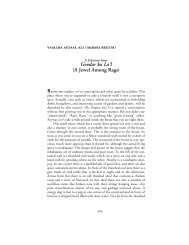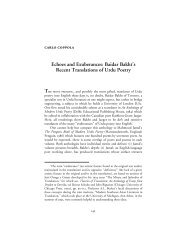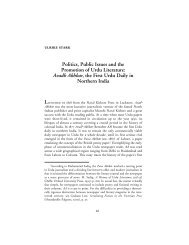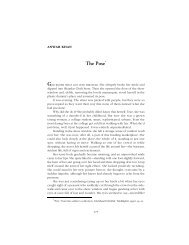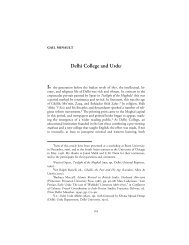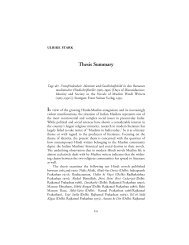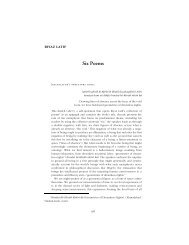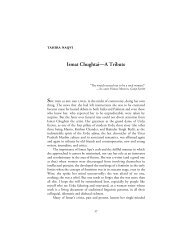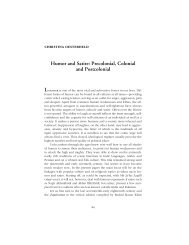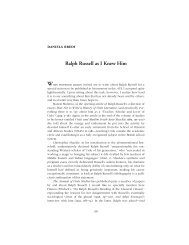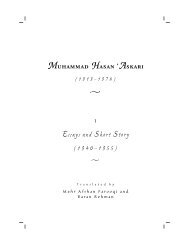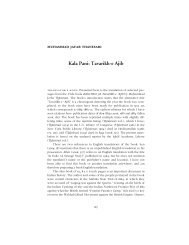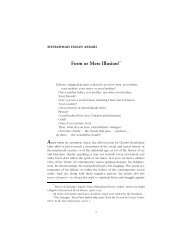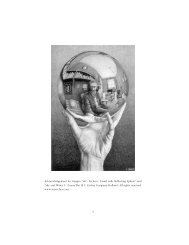White Man's World - the Annual of Urdu Studies
White Man's World - the Annual of Urdu Studies
White Man's World - the Annual of Urdu Studies
Create successful ePaper yourself
Turn your PDF publications into a flip-book with our unique Google optimized e-Paper software.
HASAN MANZAR<strong>White</strong> Man’s <strong>World</strong>IN THOSE DAYS many things had ga<strong>the</strong>red in my mind. They are <strong>the</strong>reeven now. I think <strong>the</strong> minds <strong>of</strong> all <strong>of</strong> us children were full <strong>of</strong> inquiries.We would ask each o<strong>the</strong>r questions about some <strong>of</strong> <strong>the</strong> things, or wewould approach <strong>the</strong> grown-ups. Mostly <strong>the</strong> grown-ups didn’t have timeto listen to us. Even when <strong>the</strong>y did answer our questions, <strong>the</strong>y aloneseemed satisfied with <strong>the</strong> explanations <strong>the</strong>y gave us; we knew that <strong>the</strong>ydidn’t know <strong>the</strong> real answers.Take, for example, this question: When a person dies and we dig adeep hole in <strong>the</strong> ground and leave him <strong>the</strong>re under a pile <strong>of</strong> earth, whocomes to him?Angels?But I knew that nei<strong>the</strong>r I nor any <strong>of</strong> <strong>the</strong> grown-ups had ever seen anyangels. And, <strong>the</strong>n, when someone was buried under a pile <strong>of</strong> dirt and shuttightly inside a wooden box, how could any angel get inside to talk tohim and carry him to <strong>the</strong> Heavenly Fa<strong>the</strong>r? These were all lies.My older sister is very fond <strong>of</strong> reading. She lies on her stomach all <strong>the</strong>time to read her story-books. When I am on speaking terms with her, shesometimes reads a story to me and to my younger sister. She has a wholelibrary <strong>of</strong> books. Now I, too, have a few books. When we have a house <strong>of</strong>our own—Mommy and Papa say we’re going to have one, one day—<strong>the</strong>nI, too, shall have my own library.Most <strong>of</strong> <strong>the</strong> books my sister has are children’s detective novels. Or<strong>the</strong>y are stories <strong>of</strong> four people, one <strong>of</strong> whom is always a woman, who goon a mission, assigned <strong>the</strong>m by a person or a government, and, in <strong>the</strong>end, come back home after blowing up a big building or a bridge.“Saf®d ¥dmµ kµ Duny≥,” from his collection Rih≥’µ (Hyderabad: ¥gahµPublications, 1981), pp. 78–101.84
HASAN MANZAR • 85What <strong>the</strong> word “government” meant I did not know <strong>the</strong>n. I’m stillnot quite sure. It was something that was for <strong>the</strong> grown-ups, not for <strong>the</strong>children. It was <strong>the</strong> thing that transferred Papa from one place to ano<strong>the</strong>rand did many o<strong>the</strong>r things, which I shall talk about later.So, as I was saying, my sister has quite a few books; <strong>of</strong> <strong>the</strong>se many areby Enid Blyton. Sometimes my sister and Mommy have an argument.My sister says that no one can write a better story than Enid Blyton, andthat <strong>the</strong> greatest book in <strong>the</strong> world is Heidi, but Mommy says that <strong>the</strong>reare many great writers in <strong>the</strong> world—Tolstoy, Thomas Mann, andDostoviskido … I could never get that name right. Mommy once told mea story by that man, and I thought it was a good story. There was an oldwoman in that story who was very miserly, and a student who never hadenough money to eat and who used to sell some things to that oldwoman. One day <strong>the</strong> student made a plan and murdered her, and nobodycould find out who had killed her. In <strong>the</strong> end <strong>the</strong> boy himself went andtold everybody that he was <strong>the</strong> murderer <strong>of</strong> <strong>the</strong> old woman. The story wascalled Crime and Punishment. The old woman in <strong>the</strong> story reminds me <strong>of</strong>my grandmo<strong>the</strong>r who lives in Pretoria in South Africa.I hate my grandmo<strong>the</strong>r. She lives all alone in a house which is in anarea meant only for <strong>the</strong> houses <strong>of</strong> <strong>the</strong> rich. She proudly says that only <strong>the</strong>whites live in her area, no Asians or Africans.That is why I cannot stand her. Besides, she has hardly ever given meanything. Once, long ago, when we visited Pretoria, she gave me abattery-operated jet plane. The jet used to make <strong>the</strong> kind <strong>of</strong> noise planesmake when <strong>the</strong>y take <strong>of</strong>f. On its starboard side it had a green light and on<strong>the</strong> port side a red one, perhaps. It would move on <strong>the</strong> ground and, aftera while, make a breaking sound and <strong>the</strong>n stop.This goes far back in <strong>the</strong> past when I was really small. But even now,when we go to see her, she reminds me <strong>of</strong> that gift, and says, “Remember,young man, <strong>the</strong> beautiful jet plane I gave you? Where is it now? Does itstill work?”On a wink from Papa I have to say, “Yes, Grandma, I still have thatplane and it still works beautifully.” Actually, I’ve even forgotten what itlooked like and what side <strong>of</strong> it had which light.The old lady always asks my mo<strong>the</strong>r, “Where are you people finallygoing to settle?” I know <strong>the</strong> meaning <strong>of</strong> <strong>the</strong> word “settle.” It means tobuild a house somewhere and to stay <strong>the</strong>re forever, as <strong>the</strong> old lady hasdone herself. Then she asks, “Are you going to Australia? Why notCanada? Hank could even find a place for himself in <strong>the</strong> States.”Hank is my fa<strong>the</strong>r’s name.
86 • THE ANNUAL OF URDU STUDIESMy grandfa<strong>the</strong>r was Dutch and grandmo<strong>the</strong>r Afrikaaner. Perhaps<strong>the</strong>y hated each o<strong>the</strong>r all <strong>the</strong>ir life. My grandfa<strong>the</strong>r spent <strong>the</strong> greater part<strong>of</strong> his life in Indonesia, just so he would be away from my grandmo<strong>the</strong>r.I’ve heard Mommy and Papa whisper that my grandfa<strong>the</strong>r, later in hislife, had started living with a woman who was not white. This was one <strong>of</strong>those things which stayed in my mind in those days and which raised anumber <strong>of</strong> questions. Why did my grandfa<strong>the</strong>r do that and, if he did,what was wrong with it? I had also heard that <strong>the</strong> government did notallow him and that woman to live in South Africa, and that once, inDurban, when <strong>the</strong>y were traveling toge<strong>the</strong>r in a taxi, <strong>the</strong>y were taken to apolice station because <strong>the</strong> two <strong>of</strong> <strong>the</strong>m had different skin colors, and <strong>the</strong>government didn’t like that. Things are not that way in this countrywhere we live. Here, a Negro woman and an Indian man, or a Negro manand a British woman can go toge<strong>the</strong>r wherever <strong>the</strong>y want to—to <strong>the</strong>movies, to <strong>the</strong> circus, or just for a stroll, holding each o<strong>the</strong>r’s hands, asMommy and Papa <strong>of</strong>ten do before sunset. I like to watch <strong>the</strong>m when <strong>the</strong>ydo that. They seem to be in love with each o<strong>the</strong>r. When I grow up andget married, I too would sometimes like to go out with my wife in <strong>the</strong>same way. My wife’s hand would be around my back, as Mommy’s isaround Papa’s, and my hand will go behind her neck and rest on her farshoulder. But what worries me is that if she is taller than me, <strong>the</strong>nwalking like that may not be possible.Anyway, <strong>the</strong>re is a government in <strong>the</strong> South—Mommy and Papa callSouth Africa “South”—as well as here in this country where we live.Once I remember seeing my grandmo<strong>the</strong>r panting and breathinghard, as if she were trying to hold back her anger, and saying to Papa, “Idon’t care a hoot where your fa<strong>the</strong>r is, or if he is dead or alive. He waslow and that is what he proved by living with a dark woman. Sin or nosin, <strong>the</strong> important thing is that he lived with a dark woman.”I knew what <strong>the</strong> word “dark” meant: people are afraid <strong>of</strong> <strong>the</strong> darkand <strong>of</strong> things that are dark like <strong>the</strong> night. In <strong>the</strong> school plays I’ve seen <strong>the</strong>devil wearing black clo<strong>the</strong>s and black make-up. This continent, where welive, used to be called <strong>the</strong> Dark Continent. I imagine that long ago peopleused to live in big caves, and since <strong>the</strong>re was no electricity, <strong>the</strong>y wereafraid <strong>of</strong> coming out at night, as people still are in this small town wherewe live and where <strong>the</strong>re is no electricity. People don’t walk around atnight because <strong>the</strong>y are afraid <strong>of</strong> snakes and big scorpions, some as big asmy two hands put toge<strong>the</strong>r, and <strong>of</strong> lions and hyenas. But me, I’m notafraid <strong>of</strong> <strong>the</strong> dark, nor do I fear black people.One day when my fa<strong>the</strong>r and I were going for a morning stroll, with
HASAN MANZAR • 87our dog Mishka in tow, I asked him, “Papa, why don’t we live in <strong>the</strong>South?” Papa knocked down some neem fruit for me from a tree with hiswalking stick and said, “Do you want to live <strong>the</strong>re?” “No,” I replied, “buteven <strong>the</strong>n, …” and started nibbling at my neem fruit quietly. Mishkasniffed <strong>the</strong> bitter neem berries and <strong>the</strong>n went into <strong>the</strong> bush after someanimal, perhaps a jungle rat.Once again I asked, “Papa, is Grandpa really a low man?”“No,” he answered, so firmly that I was convinced that he reallymeant what he said. “No, your grandpa was not low; in fact, he was agreat man.” Then, after a pause, he added, “I say ‘was’ because he hasnow passed away.”I couldn’t quite figure out what to say to a grown-up at such a time.Obviously, I couldn’t pat my fa<strong>the</strong>r on <strong>the</strong> head, as he does when I’m sador when Tina or Fiona is; nor could I ask him to bend down so that Imight pat him. I couldn’t even say to him, “Please don’t feel sad.”It was a beautiful morning. Mishka had once again joined me, and<strong>the</strong> sun had just come up on our right from behind <strong>the</strong> sheet <strong>of</strong> mist.Suddenly I asked, “Papa, why did <strong>the</strong> government not allow Grandpato live in <strong>the</strong> South with that o<strong>the</strong>r woman?”In embarrassment he answered, “Perhaps <strong>the</strong>re wasn’t enough roomfor more people <strong>the</strong>re.”I knew he was lying because at night Mommy would <strong>of</strong>ten read an adfrom her medical journal and say to Papa: “Here’s ano<strong>the</strong>r one <strong>of</strong> thoseads: EMIGRATING TO SOUTH AFRICA?” This journal was published inEngland, and I had heard that ad many times: IF YOU ARE LEAVING FORSOUTH AFRICA, CANADA, AUSTRALIA, OR THE UNITED STATES, WE CAN LOOKAFTER THE PACKING AND SHIPPING OF YOUR HOUSEHOLD EFFECTS.It seems as if <strong>the</strong> whole world is being invited to settle down in SouthAfrica, but <strong>the</strong>re is no room <strong>the</strong>re for my grandpa and a dark woman.This situation is like a private joke with our family. Every house hassome bits <strong>of</strong> stories whose mention amuses every member <strong>of</strong> <strong>the</strong>household. In our house this is what makes both Mommy and Papalaugh. Little Fiona laughs, too, although she is so stupid and doesn’t evenremember meeting our grandmo<strong>the</strong>r. On such occasions Papa utters aword: “hypocrites.”When I asked Mommy about that word, she said it is used for aperson whose beliefs and acts do not match.But Fiona still regards hypocrite to be a big animal like a hippo, oreven bigger than a hippo, like <strong>the</strong> animals we <strong>of</strong>ten see in <strong>the</strong> rivers here,who sometimes overturn boats.
88 • THE ANNUAL OF URDU STUDIESSo, that morning, when I, Papa, and Mishka were returning from ourwalk, I asked him, “Papa, if I grow up and marry a Negro or a darkwoman, would it be something bad?”Papa laughed and said, “No, it won’t be bad. Do you like dark girls?”I nodded.Then teasingly he asked, “So when are you getting married?”“Not right now,” I answered, and both <strong>of</strong> us laughed.How we came to this small town is yet ano<strong>the</strong>r interesting story. Papahad been transferred here from Sierra Leone. Upon coming to thiscountry we stayed for a few days in a hotel in <strong>the</strong> Capital. As South Africais simply known as <strong>the</strong> South, <strong>the</strong> main city here is called <strong>the</strong> Capital.When this word is used, everyone knows what city is being talked about.Then when <strong>the</strong> government ordered Papa to start working in thissmall town, we went to <strong>the</strong> Capital’s railway station. The place lookeddeserted, and a big carriage which had once been used by some members<strong>of</strong> <strong>the</strong> British royalty stood in <strong>the</strong> middle <strong>of</strong> <strong>the</strong> waiting room. A smallmetal plaque with some inscription on it had been fixed in a cementblock nearby.Tina read <strong>the</strong> inscription and said that during some year in <strong>the</strong> 1800san English king and a queen had visited <strong>the</strong> city in this carriage.I heard Mommy say to Papa, “They should do away with <strong>the</strong>sememorabilia.”I didn’t quite understand her last word, but I didn’t want to ask Tinafor fear she would begin putting on airs.Later, when we boarded <strong>the</strong> train, we met a white woman who wasalready seated in <strong>the</strong> compartment. She looked at Mommy, heaved a sigh<strong>of</strong> relief, and said to <strong>the</strong> two men who had come to see her <strong>of</strong>f, “ThankGod. I think I will be able to sleep in peace.”Tina picked up her book <strong>of</strong> stories and went up to <strong>the</strong> upper berth.Fiona started rubbing her nose against <strong>the</strong> window pane and watchingoutside, and I waited for <strong>the</strong> train to move so that I might start talking toMommy and Papa. In <strong>the</strong> noise <strong>of</strong> <strong>the</strong> train I would be able to talk freely,and that woman wouldn’t hear our conversation.I knew well what Tina was reading. Most <strong>of</strong> <strong>the</strong> stories she used toread those days I’ve read by now; <strong>the</strong> rest she has told me about. That dayshe was reading stories by Tolstoy. One <strong>of</strong> <strong>the</strong>se stories was about afarmer named Pakhom who had a little land and was happy. But <strong>the</strong>n hebecame greedy and started buying more and more land in order tobecome rich. At last he decided to go to <strong>the</strong> country <strong>of</strong> <strong>the</strong> Bashkirs whereland could be had for free. There was only one condition: after leaving in
HASAN MANZAR • 89<strong>the</strong> morning he would have to return before sunset to <strong>the</strong> place fromwhich he started; all <strong>the</strong> land that he walked around would become his.But <strong>the</strong> devil put greed in Pakhom’s heart, and he decided to circle a hugepiece <strong>of</strong> land. He walked so much during <strong>the</strong> day that when he returnedto <strong>the</strong> Chieftain <strong>of</strong> <strong>the</strong> Bashkirs, <strong>the</strong> sun was already setting. He fell on<strong>the</strong> ground as he came near <strong>the</strong> Chief. The Chief said, “Now here is a realman. See how much land he has acquired!” But when Pakhom’s servanttried to lift him up Pakhom spat blood and died. So <strong>the</strong> servant had todig a grave and bury him. At this point in <strong>the</strong> story, Tina would declaim,“From <strong>the</strong> top <strong>of</strong> his head to <strong>the</strong> soles <strong>of</strong> his feet, all <strong>the</strong> land he reallyneeded was six feet.”Tina would say this as if she were delivering <strong>the</strong> Sunday sermon from<strong>the</strong> pulpit, and as if I were someone greedy like Pakhom who had to bowhis head and listen humbly. The story was called “How Much Land Doesa Man Require?”I had made up my mind long ago to read <strong>the</strong> story myself, for I feltthat Tina twisted <strong>the</strong> facts, or that, perhaps, she had in her <strong>the</strong> makings <strong>of</strong>a church-going, religious woman. I would have to find out for myselfhow much land a man really needs.The train was about to leave when an Asian woman, almost at a run,holding a baby in her arms, approached our compartment. Behind herwas her Negro servant who was carrying an older child in his arms. A girlalmost my age walked into <strong>the</strong> compartment, all <strong>the</strong> while talking to <strong>the</strong>coolie.On seeing this crowd, <strong>the</strong> white woman at first panicked and said“Oh, no!” But when she heard <strong>the</strong> Asian woman speak to <strong>the</strong> coolie inEnglish, she calmed down a bit.The coolie placed <strong>the</strong> luggage in <strong>the</strong> compartment and left. TheAsian woman and her family occupied one full berth. The Negro servantalso sat on one edge <strong>of</strong> <strong>the</strong> berth.The train whistled.The white woman, confused and angry, pointed towards <strong>the</strong> Negroservant and asked <strong>the</strong> Asian lady, “He is not going to stay in thiscompartment, is he?”The Asian woman answered her in English, “His seat is also reservedin this compartment.”“No,” she said sternly. “He is not to travel in this compartment.”She called <strong>the</strong> Negro guard who happened to be standing outside ourcompartment waving a green flag and commanded him, “Stop <strong>the</strong> train.Please.”
90 • THE ANNUAL OF URDU STUDIESThe Negro guard brought <strong>the</strong> green flag down, pulled out <strong>the</strong> redflag from under his armpit, waved it in <strong>the</strong> air, and came towards us. Thecreaking sound that <strong>the</strong> wheels had made as <strong>the</strong> train started abruptlycame to a halt, and an argument started between <strong>the</strong> white and <strong>the</strong> Asianwoman. The Negro boy cringed helplessly in his corner; even <strong>the</strong> railwayguard seemed helpless.The Asian woman explained, “I’m ill, and I need this servant to lookafter my children. That’s why I’ve got him a reservation in thiscompartment.”“No, he cannot travel in this compartment,” <strong>the</strong> white woman said asif she were ordering one <strong>of</strong> her servants.“Why not?” <strong>the</strong> Asian woman finally asked in <strong>the</strong> same tone.“Because … because …” she hesitated and said, “because <strong>the</strong> servantstravel in a separate class.”I knew she wanted to say something else—“because he is aNegro”—but living in <strong>the</strong> land <strong>of</strong> <strong>the</strong> Negroes, she couldn’t well havesaid it.The Asian woman said, “Well, madam, if this bo<strong>the</strong>rs you so much,you can change your compartment. And, in any case, he is not takingyour space.”The white woman looked towards Mommy, as if expecting her to saysomething on her behalf, but at that very moment, Papa started playingwith <strong>the</strong> youngest child <strong>of</strong> <strong>the</strong> Asian lady, and Mommy took out bars <strong>of</strong>chocolate from her purse and started distributing <strong>the</strong>m to <strong>the</strong> childrenand to <strong>the</strong> Negro boy.I knew this was Mommy’s silent response to <strong>the</strong> white woman.The white woman looked like she was about to have a fit <strong>of</strong> weeping.Her two companions who were still waiting on <strong>the</strong> platform lookedat us with a scowl. One <strong>of</strong> <strong>the</strong>m started helping her down from <strong>the</strong> train,and <strong>the</strong> o<strong>the</strong>r picked up her luggage. I heard one <strong>of</strong> <strong>the</strong>m say to her, “Youcan go by air, mi’daire.”But I’m sure <strong>the</strong> Negro guard found her room in some o<strong>the</strong>rcompartment because, as <strong>the</strong> train left, I saw <strong>the</strong> two men leave <strong>the</strong>platform without her.After this little incident our journey was pleasant, and we came tothis town which does not have electricity or tap water. But Mommy,Papa, I, Tina, Fiona—each <strong>of</strong> us likes this place because we can movearound alone wherever we want to and because everyone here knowseveryone else— <strong>the</strong> Negroes, <strong>the</strong> Asians, <strong>the</strong> white people, and even thosewhose skin is yellow like <strong>the</strong> underbelly <strong>of</strong> a gecko, but who have short
HASAN MANZAR • 91crinkly hair.I’ve heard people say that <strong>the</strong> mo<strong>the</strong>rs <strong>of</strong> <strong>the</strong>se people were Negroes,and <strong>the</strong>ir fa<strong>the</strong>rs Europeans who, when <strong>the</strong> British rule came to an end,went back to Europe.How can that be possible? This, too, was one <strong>of</strong> those things thatstayed in my mind and bo<strong>the</strong>red me. How can a fa<strong>the</strong>r leave his childrenand go away forever? Once when I asked Tina this question, she answeredas grown-ups <strong>of</strong>ten do: “Strange, isn’t it?”I knew that she did not want to answer my question, or that she didnot herself know <strong>the</strong> answer. She would argue with me on such mattersonly when she had something to say to me to shut me up, something shehad perhaps read in a book some days ago. At such times, her manner <strong>of</strong>speech would always become that <strong>of</strong> <strong>the</strong> grown-ups.One day when Papa was away on a tour and Mommy was busylooking after her patients at home, Tina came to me and whispered, “Doyou want to see someone being buried?”“Who died?” I asked impatiently. “Let’s go.”She put her finger on her lips to keep me quiet and answered, “Adriver from Papa’s team.”“Which one?” I asked eagerly.“You’ll see soon enough,” she said and motioned me to follow her.Tina had no school that day. Fiona was outside playing with <strong>the</strong> dog,and we were afraid <strong>the</strong> two <strong>of</strong> <strong>the</strong>m might want to accompany us if <strong>the</strong>ysmelled us. But Tina had <strong>the</strong> whole trip carefully planned in her mind. Atthat time she looked more like one <strong>of</strong> <strong>the</strong> characters from her adventurestories than <strong>the</strong> sister I knew.We left <strong>the</strong> main road and walked through a corn field, and entered<strong>the</strong> hospital, which was about a mile away from our house, by climbing<strong>the</strong> boundary wall.At a little distance from <strong>the</strong> hospital was a deserted building whosedoor had a lock on it. She took me to that building. Standing on her toes,she peered into each <strong>of</strong> <strong>the</strong> windows and <strong>the</strong>n asked me to look insideone window.Inside, on a white tiled table, lay one <strong>of</strong> Papa’s drivers, <strong>the</strong> one whohad brought me a pet monkey a few days ago.There was blood on <strong>the</strong> table. The top <strong>of</strong> <strong>the</strong> man’s head seemed tohave been cut open and <strong>the</strong>n stitched with thread. Tina said that thatmorning when his two wives went to wake him up, he was lying dead inbed, and Mommy had said that an autopsy was to be done on him beforehe could be buried.
92 • THE ANNUAL OF URDU STUDIESI asked her what “autopsy” meant, even though in doing so I had tohide my humiliation.“It means to find out if he was poisoned and that’s why he neverwoke up from his sleep. But Mommy says he had a heart attack. Shefound that out after he was cut open. That’s autopsy. His body has beensewed back again.”I moved away from <strong>the</strong> window. I didn’t want Tina to know that Iwas feeling scared. His burial was some time away, so we came backhome.An hour or so later Tina came to me again and said, “Come on.”Going through <strong>the</strong> corn field, we walked towards <strong>the</strong> Muslimgraveyard.We could see <strong>the</strong> whole scene from behind <strong>the</strong> thick shrubs. I sawPapa standing, looking downcast, among <strong>the</strong> people who were ga<strong>the</strong>red<strong>the</strong>re, and, in a way, I felt relieved that our stealthy trip would not bediscovered, for we had left Mommy and Fiona asleep at home, and Papawas standing <strong>the</strong>re, right in front <strong>of</strong> us.The driver’s body, wrapped in a white cloth, lay on a wooden plank.Blood was still oozing out <strong>of</strong> <strong>the</strong> white cloth.Two men nearby were digging a pit. The red soil which <strong>the</strong>y hadshoveled out lay in two mounds on both sides.Then some <strong>of</strong> <strong>the</strong> people filed toge<strong>the</strong>r in a straight line and wentthrough what Tina later told me was <strong>the</strong> final service for <strong>the</strong> man,whatever that meant.Papa and some men stayed on one side while this service was goingon. I knew <strong>the</strong> reason for this, but Tina also told me. Papa was aChristian, while <strong>the</strong> driver and those who had come to bury him wereMuslims.Some chameleons moved about in <strong>the</strong> bush around us, but I wasmore afraid <strong>of</strong> <strong>the</strong> red ants which were close by.A little later, <strong>the</strong> people picked up <strong>the</strong> driver’s body wrapped in <strong>the</strong>cloth and placed it inside <strong>the</strong> pit. Then <strong>the</strong>y spread some banana leaveson <strong>the</strong> body and began shoveling in <strong>the</strong> soil that had been taken outearlier. Soon <strong>the</strong> two mounds disappeared. In <strong>the</strong>ir place now <strong>the</strong>re was along grave around which <strong>the</strong> people stood. Everyone, including Papa,raised his hands to say a prayer.Tina once again looked at me <strong>the</strong> way she does when she wants toshow that she alone knows all <strong>the</strong> secrets <strong>of</strong> <strong>the</strong> world, and whispered inmy ear, “Six feet. See? From his head to his toes, that was all <strong>the</strong> land heneeded.”
HASAN MANZAR • 93I was grateful to Tina for having brought me <strong>the</strong>re to watch <strong>the</strong>burial, but even <strong>the</strong>n I hated her sermonizing.In <strong>the</strong> evening, in Tina’s presence, I asked Mommy, “Was Tolstoyreally a great writer, Mommy?”Tina’s ears turned crimson.Mommy said, “Yes. He was truly great.”“Even greater than Johanna Spyri and Enid Blyton?”Mommy seriously said, “Maybe not yet, but when you grow up,perhaps he may also grow with you to become a greater writer thanJohanna Spyri and Enid Blyton.”“And whatever he writes, is it absolutely true?” I asked.“Yes.”“Is it, <strong>the</strong>n, true that a man needs only six feet <strong>of</strong> land?”“In a way, yes, it’s true.”I think Tina had started sweating by this time, but she did not movefrom her seat.“Then, why…?” I stopped.“Why what?” Mommy asked in an exploring tone.“Oh, nothing,” I tried to evade <strong>the</strong> subject.“It seems <strong>the</strong>re is something,” Papa joined in <strong>the</strong> conversation for <strong>the</strong>first time.He had been quiet since <strong>the</strong> evening. The driver’s sudden death hadobviously touched him. The driver and Papa had been toge<strong>the</strong>r on manylong trips through <strong>the</strong> dense forest which is dark even in daytime, andwhere one is afraid <strong>of</strong> attacks by wild animals and by <strong>the</strong> enemytribesmen who might recognize <strong>the</strong> driver by <strong>the</strong> marks on his face andtry to kill him. In such situations, Papa would take over <strong>the</strong> wheel and <strong>the</strong>driver would hide between <strong>the</strong> seats in <strong>the</strong> back. At eating time, if <strong>the</strong>driver’s food was finished, he would start eating from Papa’s plate—ifPapa wasn’t eating pig’s meat—and sometimes even Papa shared <strong>the</strong>driver’s food.I knew that, like me, Papa was also feeling sad because, in <strong>the</strong>afternoon, <strong>the</strong> two <strong>of</strong> us had been patting <strong>the</strong> back <strong>of</strong> <strong>the</strong> monkey <strong>the</strong>driver had given me.Then I almost exploded, “It’s all lies, all lies.”Mommy and Papa looked at each o<strong>the</strong>r.“What’s all lies?” Mommy asked me. “Do you mean all that Tolstoyhas written?” she asked again, politely.“Has anything happened?” Mommy <strong>the</strong>n asked Tina.Tina bowed her head.
94 • THE ANNUAL OF URDU STUDIES“Okay, okay. We’ll talk about it after supper,” Papa said.I wasn’t sure if I was sad and crying or just angry. Also, if I was angry,was it at Tolstoy or at Tina? And if I was sad and crying, was it at <strong>the</strong>driver’s death or some o<strong>the</strong>r thing?Images <strong>of</strong> people—my grandmo<strong>the</strong>r, <strong>the</strong> white woman whom we hadmet in <strong>the</strong> train for a while, and dozens <strong>of</strong> o<strong>the</strong>rs—were floating in mymind.I recalled <strong>the</strong> words <strong>of</strong> <strong>the</strong> Sunday morning sermons in our Churchand all those things I had heard in <strong>the</strong> car during our night-long travellast summer from Pretoria to Durban, when we last met grandmo<strong>the</strong>r. Atour departure she had said to Papa, “Hank, you are welcome to comeback here anytime you want. This is <strong>the</strong> only country in <strong>the</strong> world where<strong>the</strong> settlers had only one ideal—that when <strong>the</strong>y sit outside on <strong>the</strong> steps <strong>of</strong><strong>the</strong>ir houses, <strong>the</strong>y should not see <strong>the</strong> smoke rising from <strong>the</strong> chimney <strong>of</strong><strong>the</strong>ir nearest neighbor’s house.”During that journey a friend <strong>of</strong> Papa’s was driving <strong>the</strong> car. Papa sat in<strong>the</strong> front seat, and Mommy, I, Fiona, and Tina were in <strong>the</strong> back. At nighttime, on a long stretch <strong>of</strong> road which went smoothly for miles and miles,who could have stayed awake for long?The hills which during <strong>the</strong> day seemed wrapped in <strong>the</strong> green velvetygrass were hidden by <strong>the</strong> darkness. Once in a while <strong>the</strong> headlights wouldshow where one or ano<strong>the</strong>r began to rise from <strong>the</strong> roadside.We were passing through familiar cities and towns—Colenso,Ladysmith, Pietermeritzburg, all <strong>of</strong> which were quiet.The houses <strong>of</strong> <strong>the</strong> white Afrikaaner farmers stood quietly on <strong>the</strong>farms, miles away from each o<strong>the</strong>r. In one corner <strong>of</strong> each kraal, very closetoge<strong>the</strong>r, were <strong>the</strong> quarters <strong>of</strong> each farmer’s servants.Even during <strong>the</strong> day I had found <strong>the</strong> streets <strong>of</strong> Pietermeritzburgdeserted. At night <strong>the</strong>y seemed even more frightening, even though <strong>the</strong>ywere lit. They seemed to have been made empty <strong>of</strong> people.After talking for a while, Mommy had gone to sleep. Fiona had beenasleep since <strong>the</strong> journey began, and Tina couldn’t keep awake for long,for she couldn’t read.Papa and his friend were <strong>the</strong> only ones talking. They were speaking inlow tones, saying things which were altoge<strong>the</strong>r new for me. For instance,<strong>the</strong>y said that when <strong>the</strong> settlements in <strong>the</strong> South had just begun, somewoman had written in her journal that <strong>the</strong> policy <strong>of</strong> equality for blacksand whites was against <strong>the</strong> teachings <strong>of</strong> <strong>the</strong> Bible.What “policy” meant I did not know, but I knew that what <strong>the</strong>Sunday sermons in our town said was different from what that woman
HASAN MANZAR • 95had written.Ano<strong>the</strong>r thing <strong>the</strong>y talked about was <strong>the</strong> belief among <strong>the</strong> whitepeople in <strong>the</strong> South that it was against God’s laws to give equal rights toblacks and whites, and that it was every free man’s birthright to acquire asmuch land as he wanted.Much <strong>of</strong> what <strong>the</strong>y said at that time I couldn’t understand fully, but,as always, I enjoyed listening to Papa. Even his friend talked like him.They talked about <strong>the</strong> original peoples <strong>of</strong> Australia, about <strong>the</strong>American Indians, about <strong>the</strong> Israelis who had come from Europe andabout <strong>the</strong> Jews who were non-Europeans.I felt as if all <strong>the</strong> countries <strong>of</strong> <strong>the</strong> world had been taken over by <strong>the</strong>white people, each one <strong>of</strong> whom was running, like Pakhom, to possess asmuch land as he could, even if in <strong>the</strong> effort he had to destroy <strong>the</strong>Negroes, <strong>the</strong> American Indians, and many o<strong>the</strong>r darker races <strong>of</strong> <strong>the</strong>world.I woke up when <strong>the</strong> car stopped at Durban. In <strong>the</strong> early light <strong>of</strong> <strong>the</strong>day I saw Papa’s friend shaking hands with him and with Mommy.Before leaving, he said, “So, Hank, not coming back to thisgorgeously beautiful suffocating country?”Papa said, “No, thanks. But you look after yourself.”Some time later we came to know that that friend <strong>of</strong> Papa’s had beensent to prison.After supper Fiona was sent upstairs, and Papa and Mommy listenedto Tina tell <strong>the</strong>m about her little adventure <strong>of</strong> <strong>the</strong> day, <strong>the</strong> adventure inwhich she had been <strong>the</strong> leading figure. By that time I had overcome myanger or whatever it was that had made me feel so miserable earlier. I wasin control <strong>of</strong> myself.“So, what is it, son?” Mommy asked me.“What?” I asked.“What has your adventure <strong>of</strong> <strong>the</strong> day got to do with Tolstoy?”Hesitatingly, I repeated <strong>the</strong> things I had heard during our car journeyfrom Pretoria. Mommy and Papa watched me in amazement. I think <strong>the</strong>yfelt proud <strong>of</strong> my good memory.Then, suddenly, I asked <strong>the</strong>m <strong>the</strong> question that I had been meaningto ask since that afternoon, “Maybe, as you say, Tolstoy has written goodstories, but I think Tina lies when she says that a man, from his head tohis toes, really needs only six feet <strong>of</strong> land. My question is: How muchland does a white man need?”—Translated by Faruq Hassan



